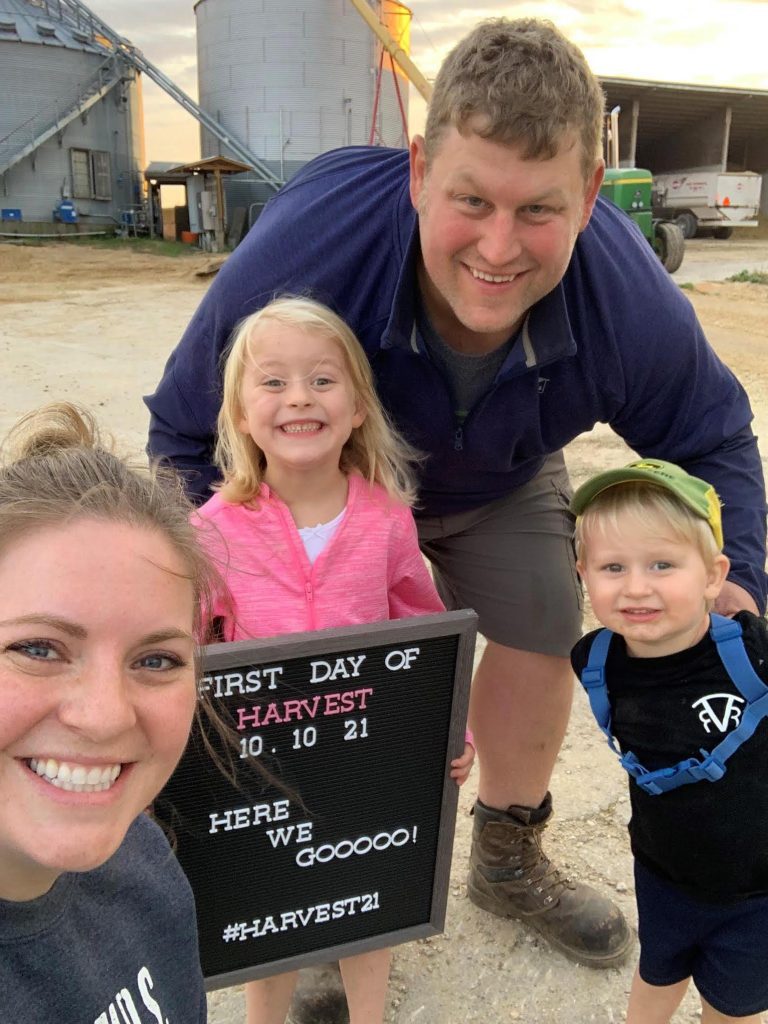Meet the Ripps: a farm family from Dane, WI growing crops and raising cattle. With fall harvest taking place all over Wisconsin right now, we caught up with Ryan and Brianna to learn more about their farm, family and what they’re doing to protect something we all have in common: our water.
 What led you to the farming profession – did you grow up on a farm?
What led you to the farming profession – did you grow up on a farm?
Ryan: I grew up on my family’s farm, helping out with chores all through my childhood. Today, I have a full-time off-farm job supporting growers, like myself, and farm in partnership with my parents and brother. My brother and I are the fourth generation to farm this ground. One of the best parts about farming as a family is working together to keep a legacy and future growing for the next generation.
Brianna: I grew up on a dairy farm in southern Wisconsin and have always been involved in agriculture. I have farming on both sides of my family so it’s really no surprise that I ended up farming, too! I love watching our kids show a passion and interest in the farm, too.
What do you grow on your farm? Tell us about your farm and your family.
Ryan: We grow corn, soybeans, rye, alfalfa (hay that’s used for animal feed), and a little bit of winter wheat. We raise dairy heifers (females that haven’t yet had a baby) that will eventually join our extended family’s dairy farm nearby. Brianna and I have our own herd of beef cattle, too, providing beef to our local community.
Brianna: We have two young kids – a 5-year-old daughter and 2-year-old son – so we think a lot about how the way we farm will impact them both now and in the future. Just like other parents we’re juggling work, family, finding time for hobbies and a lot of volunteer activities.
What steps can farmers take to protect Wisconsin’s waters? What’s new on farms today?
Ryan: We farm about 20 miles north of Madison, so knowing the impact we can have on our neighbors downstream is not lost on us. The great thing about farming today is the amount of information and resources we have to help us farm smarter and more sustainably than ever before. There are lots of conservation practices farmers can adopt (more on that in a minute), and the technology we have on the farm is practically second nature to us at this point … and also always changing and getting better. Like precision technology, which ensures we only use what’s needed in the right amounts to a targeted area to help grow crops while being mindful of the surrounding environment.
Our farm is also involved with our local watershed group that is working to protect water beyond our farm. It’s been a great opportunity for farmers and non-farmers to collaborate on finding solutions that work for all of us to keep water clean and safe.
What are you doing to farm sustainably?
Ryan: On our farm, we primarily practice no-till farming. So, for example, as we harvest our corn fields this fall our combine breaks off the ears of corn from the plant stalk. That plant stalk and other “stubble” is left in the field. Next spring, instead of tilling our fields to turn over the soil (a very common practice for previous generations of farmers), we leave all those corn stalks where they are and plant the next crop directly into them. What we’ve learned is that by leaving those stalks in the field, we can build organic matter in the soil. That’s important for plant growth and protects the soil over the winter months from wind and water erosion, keeping all our water cleaner.
We also plant cover crops each year. This happens after we harvest our crop in the fall. We’ll go back in and plant winter rye (a grass), which creates an intentional sustainability cycle on our farm:
- The rye serves as a sort of “blanket” for the soil, so it’s not exposed all winter long to erosion.
- In the spring, we go in and harvest the rye and feed it to our cattle.
- We take the manure created from our cattle and go spread it back on those fields as a natural fertilizer source.
How has the pandemic impacted farming?
Ryan: Farming during the pandemic has similarities and differences to pre-pandemic times. On one hand, we never stopped farming. Our role as farmers is essential, and we showed up every day, 365-days a year to care for our animals and crops. On the other hand, it brought to light supply chain challenges that we need to address as an industry.
Brianna: One positive to come from the pandemic was the way everyone rallied around and appreciated where their food comes from and those who grow it. We take pride in doing what is best for all families as entrusted stewards of the land. Our role as farmers is one we don’t take lightly. We’ve really enjoyed the way the pandemic opened the eyes of many to build relationships directly with their local farmers. We want that open, two-way dialogue and have enjoyed getting to share our story.
What’s your favorite farming or fall tradition in Wisconsin?
Brianna: Sign me up for a pumpkin spice latte and a chunky scarf – fall is my favorite season! Hands down, the best part of fall is harvest. It’s a time where all the hard work and faith from the spring – the planting of seeds, the hope it will grow, the trust that the markets will be strong and that mother nature kept up her end of the deal – all comes together. Fall means family time in the tractor or field meals together.
On a non-farming note, I’m a sucker for fall candles, mums galore, chili in the crockpot, Badger footballs games, baking pumpkin-flavored goodies and crisp, cool weather. What’s not to love about fall?
What’s one thing you get asked that always surprises you? or What’s one misconception many people have about farming?
Brianna: When you realize that less than 2% of the population farms, you understand that not everybody gets to see what we do, the practices we use. We impact every person every day – whether it’s food, fiber, fuel – it all starts on a farm like ours.
Ryan: I think when you’re removed from farming, it might be easy to forget there are real people – often families – behind every single food that you buy. Heck, even the ethanol you fuel your vehicle with starts with a farm family. So, whether it’s a package of ground beef or a box of cereal that was made with corn-based ingredients, those products could have very well started with corn grown on our family’s farm. And even though farming might seem like a novel profession these days, we’re just like you. We drink the same water and eat the same food, and so we care deeply about protecting the important resources needed to keep farming and fueling our lives.












